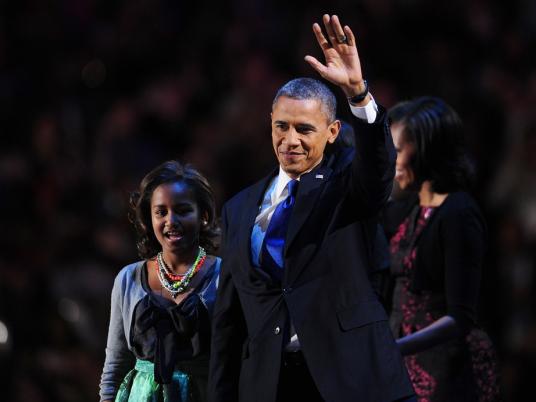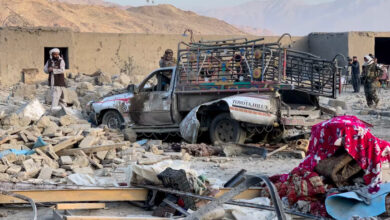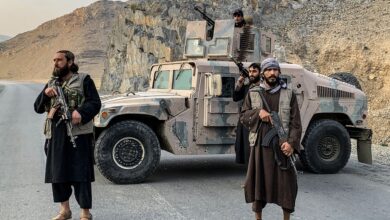
The roars celebrating the re-election of US President Barack Obama on television give Mohammad Rehman Khan a searing headache, as years of grief and anger come rushing back.
The 28-year-old Pakistani accuses the president of robbing him of his father, three brothers and a nephew, all killed in a US drone aircraft attack a month after Obama first took office.
"The same person who attacked my home has gotten re-elected," he told Reuters in the capital, Islamabad, where he fled after the attack on his village in South Waziristan, one of several ethnic Pashtun tribal areas on the Afghan border.
"Since yesterday, the pressure on my brain has increased. I remember all of the pain again."
In his re-election campaign, Obama gave no indication he would halt or alter the drone program, which he embraced in his first term to kill Al-Qaeda and Taliban militants in Pakistan and Afghanistan without risking American lives.
Drone strikes are highly unpopular among many Pakistanis, who consider them a violation of sovereignty that cause unacceptable civilian casualties.
"Whenever he has a chance, Obama will bite Muslims like a snake. Look at how many people he has killed with drone attacks," said Haji Abdul Jabar, whose 23-year-old son was killed in such a bombing.
Analysts say anger over the unmanned aircraft may have helped the Taliban gain recruits, complicating efforts to stabilize the unruly border region between Pakistan and Afghanistan. That could also hinder Obama's plan to withdraw US troops from Afghanistan in 2014.
Obama authorized nearly 300 drone strikes in Pakistan during his first four years in office, more than six times the number during the administration of George W. Bush, according to the New America Foundation policy institute.
Since 2004, a total of 337 US drone strikes in Pakistan have killed between 1,908 and 3,225 people.
The institute estimates about 15 percent of those killed were non-militants, although that percentage has declined sharply to about 1-2 percent this year. Washington says drone strikes are very accurate and cause minimal civilian deaths.
The Pakistani government says tens of thousands of Pakistanis have been killed in the fight against militants. Many were civilians caught in suicide bombings. Others were killed by the Pakistani army.
'No difference'
Getting accurate data on casualties and the effects of drones is extremely difficult in the dangerous, remote and often inaccessible tribal areas. The Taliban often seal off the sites of strikes.
While the aerial campaign has weakened Al-Qaeda, its ally, the Pakistani Taliban, remains a potent force despite a series of Pakistan army offensives against their strongholds in the northwest.
Seen as the biggest security threat to the US-backed Pakistani government, that faction of the Taliban is blamed for many of the suicide bombings across Pakistan, and a number of high-profile attacks on military and police facilities.
"We are amazed that Obama has been re-elected. But for us there is no difference between Obama and Romney; both are enemies. And we will keep up our jihad and fight alongside our Afghan brothers to get the Americans out of Afghanistan," said Pakistan Taliban spokesman Ehsanullah Ehsan.
On Thursday, a suicide bomber rammed the gates of a military base in Pakistan's biggest city, Karachi, killing at least one soldier and wounding more than a dozen people.
Pakistanis were largely indifferent in the run-up to Tuesday's election, expecting little change to the drone attacks regardless of whether Obama or Republican challenger Mitt Romney won.
"Any American, whether Obama or Mitt Romney, is cruel," Warshameen Jaan Haji, whose neighborhood was struck by a drone last week, told Reuters on the eve of the election. "I lost my wife in the drone attack and my children are injured. Whatever happens, it will be bad for Muslims."
Pakistani politician Imran Khan, a vocal critic of US drone strikes, said he believed Obama stepped up the attacks in his first term so he wouldn't look weak on national security.
"I think Obama essentially has an anti-war instinct," he told Reuters. "Without the worry of being re-elected, he will de-escalate the war, including the use of drones. This is positive."
But for Mohammad Khan, who is not related to the former cricketer, the damage is already done.
The February 2009 drone attack that destroyed his home left him as the main provider for 13 family members, forcing him to move to Islamabad and work with a real estate company.
"When the Sandy hurricane came, I thought that Allah would wipe away America," he said. "America just wants to take over the world."



